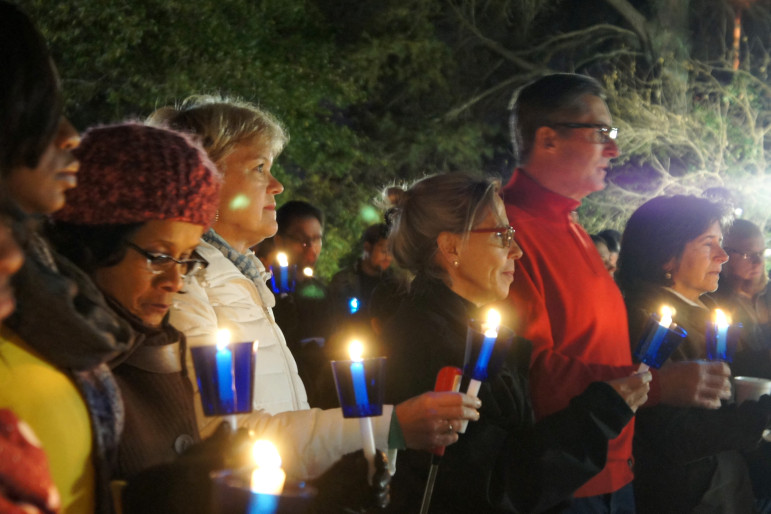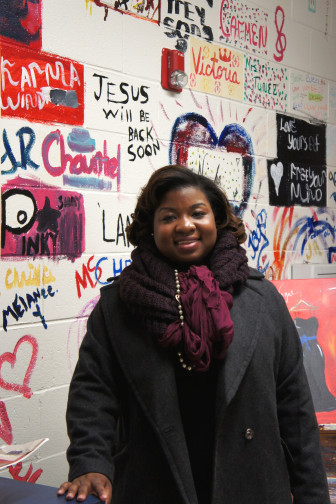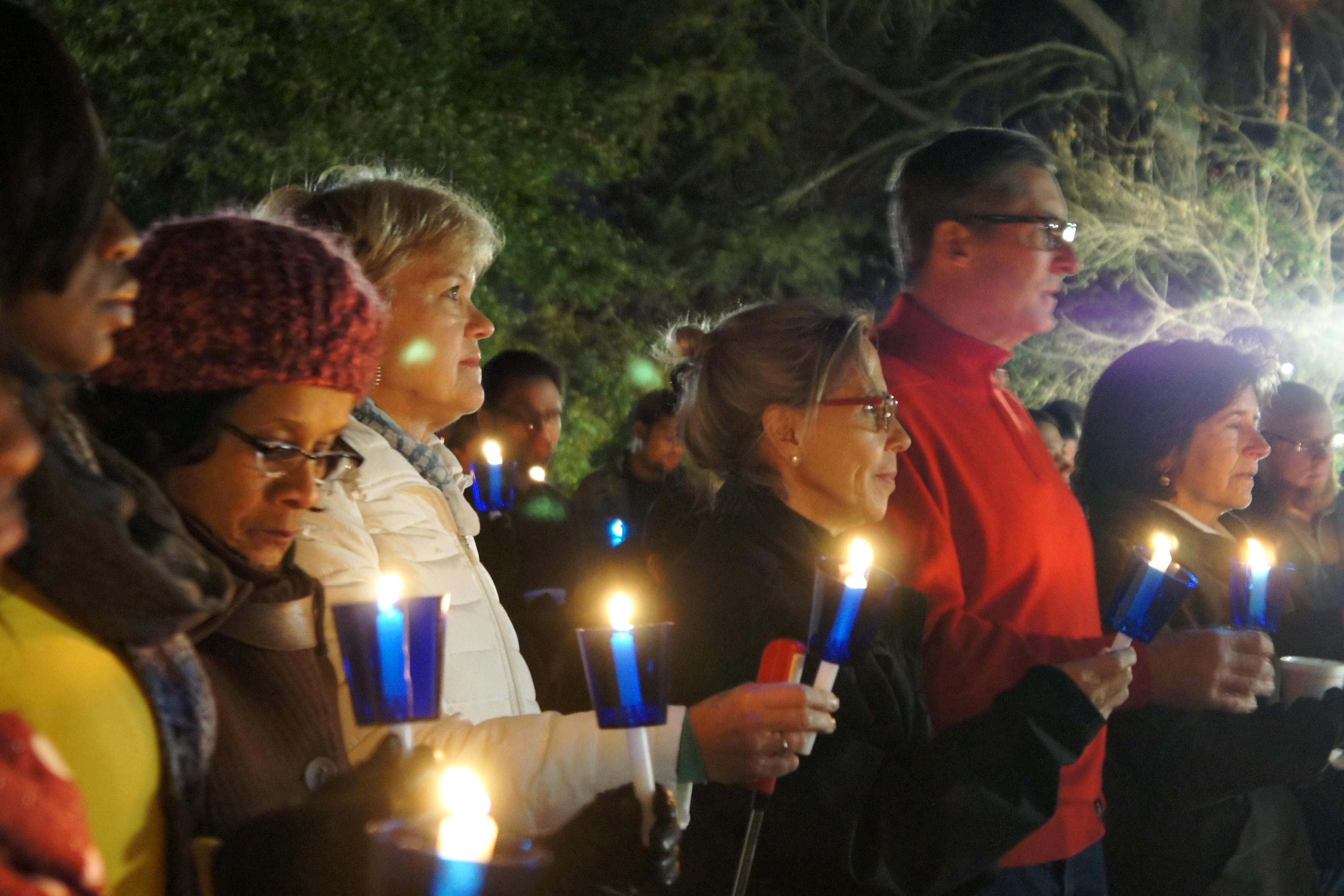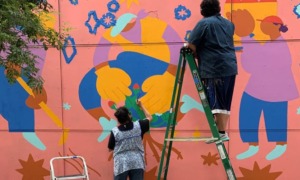
Stell Simonton
Supporters and volunteers gathered at Covenant House Georgia in November. Here, they hold candles and listen to a list of names of homeless teens who have died on the street.
Three nights a week Todd Wilcher gets in a van and drives down Atlanta streets. He stops at the places homeless kids congregate.
He chats with them and hands out blankets, food and kits with soap and toothbrushes.
“We go out on the street … to try to get them to a place to come back to Covenant House,” he said.
Wilcher is the outreach director of Covenant House Georgia, a shelter for homeless youth ages 18-21. He focuses on building trust with kids on the streets. He spends a lot of time in conversation, letting them know how the shelter can assist them.
Covenant House shelters are located in 27 cities in the United States, Canada, Mexico and Central America. They provide comprehensive services to homeless youth.
Begun in New York in the 1970s by a Franciscan priest, Covenant House grew quickly and gained the backing of major donors. In the 1990s, it weathered a scandal after founder Bruce Ritter was accused of having sexual relationships with young men at the shelter and of misusing funds. He was forced to resign. Support for the organization plummeted until a new leader, Sister Mary Rose McGeady, stepped in to rebuild the network of shelters.
By 2013, Covenant House sites in North America and Central America were sheltering an annual total of 56,000 young people.
Its regrowth coincides with an increasing need for assistance among homeless youth.
In November the National Center on Family Homelessness reported a historic high in the number of homeless kids in the United States. One in 30 — 2.5 million — experienced homelessness in 2013, according to the report, America’s Youngest Outcasts.
Many kids leave home because of ongoing physical or sexual abuse, parental neglect or addiction, according to the National Coalition for the Homeless.
Statistics show that half of adolescents aging out of foster care and juvenile justice systems become homeless within six months, according to Covenant House.
Up to 40 percent of homeless youth identify as lesbian, gay or transgender, according to the National Gay and Lesbian Task Force. They leave home because of family conflict over their sexual orientation or identity, the task force said.
The National Center on Family Homelessness also cites the nation’s high poverty rate and lack of affordable housing across the nation.
Stranded young adults
Teens come to shelters like Covenant House by different routes.
“I was in a hotel room crying,” said Jameisha, 21. “I had nowhere to go.”
A man cleaning the hotel told her to call 211, the United Way referral number, which referred her to Covenant House Georgia.
She had come to Atlanta from Savannah, Ga., to take an internship in the fashion industry, but the internship didn’t work out. She had no family support. Back at home, she had been a de facto mother to her younger sisters, because her mother was unable to take care of them.

Stell Simonton
A young woman in the Rights of Passage program at Covenant House shows off the art room. Here, kids have left their names painted on the wall.
Jameisha entered a program at Covenant House called Rights of Passage, which helps young people transition to independent living. She is now on track to graduate from Georgia Perimeter College with an associate’s degree in English and theater. She’s also a contestant in the Miss Georgia USA pageant.
Another young woman in Rights of Passage is Jennifer, 22. She had been sexually abused as a child, and then at age 16 was kicked out of her home when she told her family she was a lesbian.
She spent four years on Atlanta streets, often sleeping under a bridge on Martin Luther King Jr. Boulevard. Sometimes she stayed at the “tent city” under the overpass where I-20 and I-75 meet.
She often waited outside restaurants until closing time to ask for the food being thrown away. However, she drew the line at some things. “I wouldn’t dig in the trash” for food, she said.
She spent a lot of time in the Atlanta-Fulton Central Library. “I’ve read almost every book in the kids’ section,” she said.
She was involved in drugs and prostitution and gave birth in a hotel bathroom.
When Jennifer finally took refuge at Covenant House, she almost didn’t stay. Several girls were harassing her for being a lesbian, she said.
But support from a staff person helped her deal with it, she said. “[Covenant House] saved my life,” she said. “I now have hope for the future.”
Covenant House has built a reputation for understanding and meeting the needs of LGBTQ kids.
Rick Westbrook, founder of Lost-n-Found Youth, an Atlanta shelter serving LGBTQ kids, praises the organization. “They listen to what we have to say concerning transgender issues and HIV.” When the Lost-n-Found shelter is filled, Westbrook is happy to refer kids to Covenant House.
“I trust them,” he said.
In November, the True Colors Fund, a leading national organization focused on the needs of homeless LGBTQ kids, announced a partnership with Covenant House. The two will work together to put best practices in place for serving LGBTQ youth.
Services offered
At Covenant House Georgia, all 45 beds in the emergency shelter are filled every night, said Kellie Glenn, a spokesperson.
Kids can stay there for 30 days (although it’s possible to extend that time).
Within 48 hours, an assessment is done to determine each youth’s needs, said Lorie Davidson, clinical case manager. Physical health, mental health, substance abuse and educational needs are assessed, as well as job readiness. A plan is drawn up “to help them in their homelessness,” she said.
Covenant House Georgia offers an array of services, including GED classes and vocational training. Youth may also participate in Narcotics Anonymous and Alcoholics Anonymous groups.
The goal is “to wrap the support around them,” Davidson said.
The needs of the young people vary, but many start work on their high school equivalent diploma, Glenn said. “A lot of our youth come to us below a sixth-grade reading level,” she said.
“A lot come and don’t have any [official] identification. We help them get their birth certificate.”
Rights of Passage currently has 36 youth who live in cottages at Covenant House Georgia or in apartments in the city. Youth can stay in this program for two years, Glenn said.
To help place young people in jobs, Covenant House Georgia has partnerships with employers such at Starwood Hotels and Chatham Landscape Services, said Regina Jennings, director of support services.
Students take job preparation classes that include instruction on conflict management, communicating with supervisors, resume-writing and interviewing.
“This is key to ending their homelessness,” Jennings said.
She also runs the Cov Cafe, a Thursday night coffeehouse where kids recite poetry and perform.
“We want youth to have an opportunity to express themselves,” she said. They’ve experienced so much in their lives, she said.
In November, Covenant House Georgia held its annual “sleepout” along with other Covenant House locations across the U.S. and Canada. Community members join the staff in sleeping outdoors that night. The event raises awareness of homelessness and is also a fundraiser.
During the evening, youth from Covenant House spoke about their experiences.
Poised and articulate, Jennifer read some of her poetry. She told the group about pursuing her GED and getting job training. Soon she’ll start work as a carpenter’s apprentice. After that, she hopes to go to college and study early childhood education and business.
She’s also got her eye on an empty building in downtown Atlanta near Peachtree and Pine streets. One of these days she’d like to acquire it and run a nonprofit that provides services to homeless teens.
































